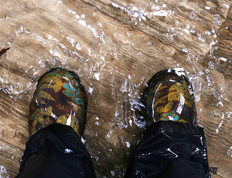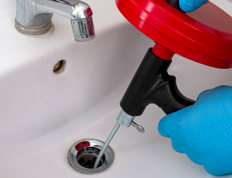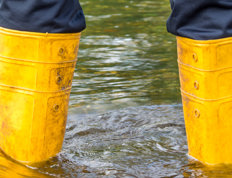



Water is the leading cause of home insurance claims and can do a lot of damage.
Water-related incidents that can cause significant damage include an overflowing bathtub, a burst water pipe, water seeping through the roof or foundation, sewers backing up and a river flooding your basement.
Some losses are automatically covered in your home insurance policy, while others are only covered if you’ve included additional coverage in your policy.
Your home insurance policy includes coverage for water damage caused by:
If you want to be covered for damage caused by water infiltration, sewer back-up or a waterway overflow, you’ll have to add coverage to your contract, also known as an endorsement. An endorsement comes with a coverage amount that is separate from what’s included in your policy. It’s important to look it over to find out how much insurance is available.
Read our article entitled 9 questions about flood insurance.
You should call your insurer as soon as possible to have a claims adjuster handle your claim.
At this step, the claims adjuster will verify the validity of your policy, the included coverage and coverage limits to determine whether or not your policy covers the damage and to confirm the coverage amount, if any.
If you have a water damage endorsement, you should check the coverage amount to quickly find out how much you’re entitled to. If this amount is not enough to cover all of the damage, you’ll have to decide how to use the money at your disposal.
It’s important to act fast after flooding to stop it from getting worse by:
If the damage is significant and is covered, your insurer will arrange to have a post-loss cleaning company empty out and clean the damaged area.
If you’ve already done some work, keep the invoices and receipts since they may be eligible for reimbursement.
" Did you know that the costs of cleaning or storing items, or for clearing your residence, are paid out of the insurance settlement? "
You may need to evacuate the premises, depending on the type of damage suffered.Talk to your insurer about this, as your policy may cover the additional costs you incur for food and accommodation while your home is being repaired.
At this step, you’ll establish the cost of the damage and how the damaged property will be repaired or replaced. You’ll have to:
If your home has sustained damage, the cost to repair or replace the damaged areas will be assessed.
Your home insurer is required to return your belongings and your home to the state they were in prior to the loss, according to the terms and conditions and coverage amounts of your policy.
Your insurer also has to indemnify you for the loss within 60 days of receiving your claim or any information or supporting documents it may request.
Your insurer will have the damaged property cleaned and repaired if possible. If not, your belongings will be replaced according to the terms and conditions of your contract.
Depending on the agreement, your insurer may pay you the indemnity or pay the service providers or contractors directly.
Don’t forget your deductible: your insurer will deduct the amount of your policy deductible from the compensation amount.












